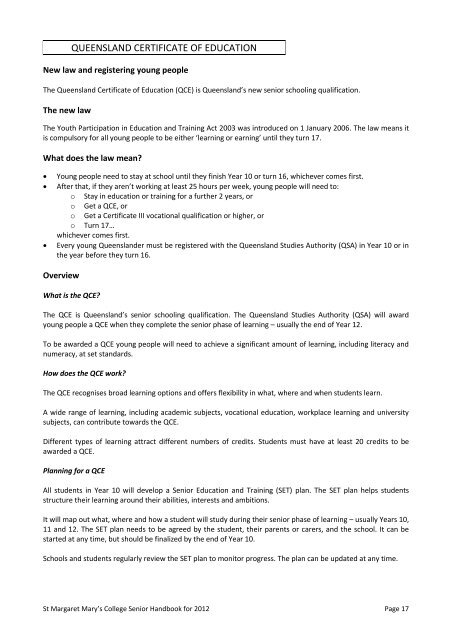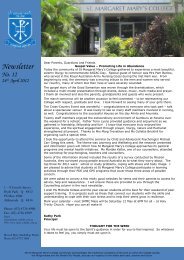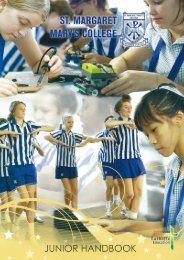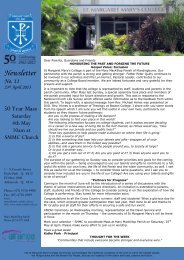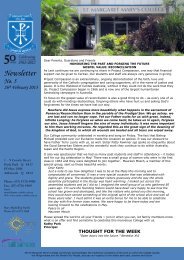SENIOR HANDBOOK for 2012
PRINCIPAL'S MESSAGE - St Margaret Mary's College
PRINCIPAL'S MESSAGE - St Margaret Mary's College
- No tags were found...
You also want an ePaper? Increase the reach of your titles
YUMPU automatically turns print PDFs into web optimized ePapers that Google loves.
QUEENSLAND CERTIFICATE OF EDUCATION<br />
New law and registering young people<br />
The Queensland Certificate of Education (QCE) is Queensland’s new senior schooling qualification.<br />
The new law<br />
The Youth Participation in Education and Training Act 2003 was introduced on 1 January 2006. The law means it<br />
is compulsory <strong>for</strong> all young people to be either ‘learning or earning’ until they turn 17.<br />
What does the law mean?<br />
<br />
<br />
<br />
Young people need to stay at school until they finish Year 10 or turn 16, whichever comes first.<br />
After that, if they aren’t working at least 25 hours per week, young people will need to:<br />
o Stay in education or training <strong>for</strong> a further 2 years, or<br />
o Get a QCE, or<br />
o Get a Certificate III vocational qualification or higher, or<br />
o Turn 17…<br />
whichever comes first.<br />
Every young Queenslander must be registered with the Queensland Studies Authority (QSA) in Year 10 or in<br />
the year be<strong>for</strong>e they turn 16.<br />
Overview<br />
What is the QCE?<br />
The QCE is Queensland’s senior schooling qualification. The Queensland Studies Authority (QSA) will award<br />
young people a QCE when they complete the senior phase of learning – usually the end of Year 12.<br />
To be awarded a QCE young people will need to achieve a significant amount of learning, including literacy and<br />
numeracy, at set standards.<br />
How does the QCE work?<br />
The QCE recognises broad learning options and offers flexibility in what, where and when students learn.<br />
A wide range of learning, including academic subjects, vocational education, workplace learning and university<br />
subjects, can contribute towards the QCE.<br />
Different types of learning attract different numbers of credits. Students must have at least 20 credits to be<br />
awarded a QCE.<br />
Planning <strong>for</strong> a QCE<br />
All students in Year 10 will develop a Senior Education and Training (SET) plan. The SET plan helps students<br />
structure their learning around their abilities, interests and ambitions.<br />
It will map out what, where and how a student will study during their senior phase of learning – usually Years 10,<br />
11 and 12. The SET plan needs to be agreed by the student, their parents or carers, and the school. It can be<br />
started at any time, but should be finalized by the end of Year 10.<br />
Schools and students regularly review the SET plan to monitor progress. The plan can be updated at any time.<br />
St Margaret Mary’s College Senior Handbook <strong>for</strong> <strong>2012</strong> Page 17


